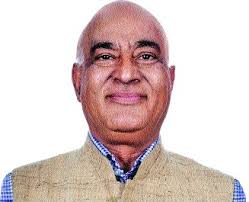Synchronised elections, voter behaviour, and governance outcomes
An active policy proposal of the Government of India is to hold national elections at the same time as the assembly elections of all the states. This article examines whether holding national and stat...
-
 Vimal Balasubramaniam
Vimal Balasubramaniam  Sabyasachi Das
Sabyasachi Das  Apurav Yash Bhatiya
Apurav Yash Bhatiya  28 August, 2020
28 August, 2020
- Articles
Political determinants of newspaper markets in India
Newspapers are an important source of political information for Indian voters. This article looks at how political factors influence the newspaper market. Using the announcement of delimitation in the...
-
 Julia Cagé
Julia Cagé  Guilhem Cassan
Guilhem Cassan  Francesca R. Jensenius
Francesca R. Jensenius  23 November, 2023
23 November, 2023
- Articles
A proposal for public funding of elections and political parties in India
The Finance Minister of India recently introduced measures aimed at cleaning up political party funding in the country. In this article, Gowda and Santhosh highlight the limitations of these measures,...
-
 M.V. Rajeev Gowda
M.V. Rajeev Gowda  Varun Santhosh
Varun Santhosh  21 April, 2017
21 April, 2017
- Perspectives
Free speech and the rule of law
In this article, Maitreesh Ghatak, Professor of Economics at the London School of Economics, argues that the fight over freedom of expression in India is a shadow fight; the real fight is about preser...
-
 Maitreesh Ghatak
Maitreesh Ghatak  07 April, 2017
07 April, 2017
- Perspectives
Tax, lies, and red tape
Weak institutional environments in poor countries may lead to lower tax compliance by firms. This may be especially true for family firms, whose owners have higher stakes in the firm and longer horizo...
-
 Megha Patnaik
Megha Patnaik  31 March, 2017
31 March, 2017
- IGC Research on India
Bidding for roads
This project aims to understand how to make it harder for local politicians to capture small-scale infrastructure projects. In the context of the bidding process for contracts under India’s flagship...
-
 Oliver Eynde
Oliver Eynde  Jacob Shapiro
Jacob Shapiro  31 March, 2017
31 March, 2017
- IGC Research on India
The Impact of Community Mobilization on Land Rights Governance: Evidence from a Homestead Land Entitlement Initiative in Gaya District of Bihar, India
This project evaluates the impact of a community level program in Gaya district that seeks to establish, train, and mobilize village-level community-based organizations to assist Scheduled Caste house...
-
 Sanjay Kumar
Sanjay Kumar  Andre Nickow
Andre Nickow  31 March, 2017
31 March, 2017
- IGC Research on India
Bidding for Roads
The project looks into the mechanisms of political influence by analyzing whether contractors without political connections are deterred from applying, or whether the evaluation process is biased in f...
-
 Oliver Eynde
Oliver Eynde  Jonathan Lehne
Jonathan Lehne  Jacob Shapiro
Jacob Shapiro  31 March, 2017
31 March, 2017
- IGC Research on India
Rural development programmes: Implementation challenges and solutions
With a majority of the population living in rural areas in India, rural development is key to the development of the country. Based on his experience of working closely with the district administratio...
-
 Pushkar Pahwa
Pushkar Pahwa  17 March, 2017
17 March, 2017
- Perspectives
Deconstructing the global wave of right-wing populism
At present, there seems to be palpable reaction against ideas of tolerance, minority rights, freedom of expression, and respect for individual autonomy and dignity, in many parts of the world. In thi...
-
 Pranab Bardhan
Pranab Bardhan  08 February, 2017
08 February, 2017
- Perspectives
Unique Health Identification and Aadhaar: A case for mandatory linkage
As part of the Digital India initiative, All India Institute of Medical Sciences (AIIMS) issues a Unique Health Identification (UHID) number to each patient, which documents their entire journey in th...
-
 Mudit Kapoor
Mudit Kapoor  23 December, 2016
23 December, 2016
- Perspectives
Do Gram Panchayat leaders favour their own constituencies in MNREGA fund allocation?
Political incentives are known to play a role in the allocation of public resources from upper- to lower-tier governments. This column seeks to examine whether ruling parties in local governments favo...
-
 Subhasish Dey
Subhasish Dey  Kunal Sen
Kunal Sen  19 December, 2016
19 December, 2016
- Articles
Governance performance of Indian states: 2001-02 and 2011-12
Defining governance as service delivery, this column develops a measure of the quality of governance – also adjusting for the impact of the level of development - and provides a ranking of major Ind...
-
 Samik Chowdhury
Samik Chowdhury  Sudipto Mundle
Sudipto Mundle  Satadru Sikdar
Satadru Sikdar  13 December, 2016
13 December, 2016
- Articles
The devil is in the details: Successes and limitations of bureaucratic reform
To address absenteeism among staff at public healthcare facilities, the government of Karnataka introduced an innovative biometric device to monitor and enforce attendance rules. This column presents ...
-
 Iqbal Dhaliwal
Iqbal Dhaliwal  Rema Hanna
Rema Hanna  Rebecca Toole
Rebecca Toole  09 December, 2016
09 December, 2016
- Articles
Politician's pain is poor man's gain: Income distribution in close-election constituencies
Studies have highlighted the role of electoral competition in directing the flow of public funds. Analysing data from India, this column finds lower income inequality and polarisation in tightly conte...
-
 Shabana Mitra
Shabana Mitra  Anirban Mitra
Anirban Mitra  09 November, 2016
09 November, 2016
- Articles
Twitter feed
Tweets by Ideas4IndiaMost Popular Governance Posts
Unique Health Identification and Aadhaar: A case for mandatory linkage
As part of the Digital India initiative, All India Institute of Medical Sciences (AIIMS) issues a Unique Health Identification (UHID) number to each patient, which documents their entire journey in th...
 Mudit Kapoor
Mudit Kapoor  23 December, 2016
23 December, 2016
- Perspectives
Caste dominance in rural India: Cause and effect
Rural India remains a caste-based society. This column explores why caste continues to play such an important role and what the effects are. It argues that trade and agricultural productivity suffer, ...
 Siwan Anderson
Siwan Anderson  16 August, 2012
16 August, 2012
- Articles
Why did the Indian economy stagnate under the colonial rule?
How did the Indian economy fare under the colonial rule? Is the average Indian significantly better off after Independence? This column examines trends in GDP per capita in order to determine the stan...
 Aniruddha Bagchi
Aniruddha Bagchi  16 September, 2013
16 September, 2013
- Articles





 16 November, 2023
16 November, 2023






